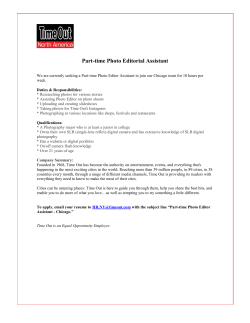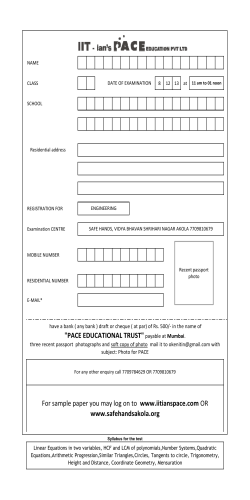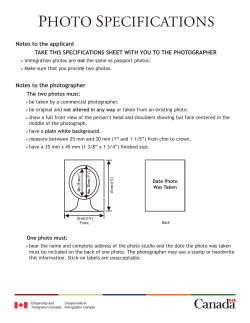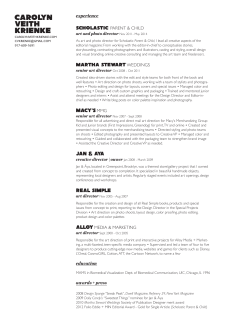
Move or lose Business Forum Imaging Cologne - CAT
A guiding force for the photo and imaging industry The four pillars of the new PMA End of last year, Georgia McCabe was appointed new CEO and Executive Director of PMA International. After the association had been downsizing its operations and loosing relevants for the global imaging industry for many years, the renowned industry veteran took over in a critical situation: During the past months, McCabe has toured the industry and talked to countless representatives of manufacturers, retailers, service providers and associations all over the world to develop a vision of the association‘s future. At the same time, McCabe re-organized PMA and appointed the award-winning association management company, Coulter, McLean, Virginia, USA, to handle the association‘s day-to-day operations. Recently, together with the PMA Executive Committee and staff, McCabe defined four key pillars of the new strategic direction for the association. INTERNATIONAL CONTACT talked with Georgia McCabe about her vision of the future of PMA. INTERNATIONAL CONTACT: Your appointment as CEO end of last year was a surprise for many people in the industry. How would you describe the situation of PMA at that point? Georgia McCabe: Before I joined PMA as CEO, the Board had assigned me to evaluate the association‘s overall operations as well as its financial situation. What I found was not exactly pleasant. After PMA had helped countless industry members to cope with the arrival of digital imaging ten or fifteen years ago, the association missed to adjust itself to the significant changes in the marketplace. Instead, it downsized its operations significantly and terminat1 ed many services for members and for the industry as a whole. We all know the results: What was used to be the world‘s annual imaging trade show is gone, the membership base eroded, and PMA lost most of its international importance as a global voice of the photo and imaging industry. Having said that, the Board and myself saw the urgent need for immediate, fundamental change. INTERNATIONAL CONTACT: We all now that the photo and imaging market has changed dramatically during recent years, for example through the collapse of the compact camera market. Is there really an opportunity to revitalize PMA while the photo business is dying? Georgia McCabe: The photo business is not dying – just the opposite! Consumers today are taking more pictures than ever before. In fact, just last year they captured and shared more than ten times the number of personal images that were taken at the peak of the analog photo business back in the early 1990th. Personally, I believe that the opportunities in photo are actually greater now than they were back in the late 18th century, when George Eastman first evangelized photography to the mass market. Eastman had to educate the consumer about the value of personal photography. Today, that‘s a given – and photo-graphy pervades all aspects of everday life. Posted personal images are by far the largest source of traffic in the exploding world of social media. As an industry, our challenge is to make it pos-sible for consumers to enjoy connected photography and, at the same time, preserve and celebrate their special images with a wide variety of exciting digital photo output products. The pro-blem has been that while many of the new p layers in digital photography understand the tremendous appeal of personal imaging, they often have little knowledge or concern for the responsibility of capturing and storing those most important moments of everyday life. Copyright by INTERNATIONAL CONCTACT 4/2015 INTERNATIONAL CONTACT: Will an association like PMA be able to change that? Georgia McCabe: I strongly believe that PMA can play an important role to turn things to the better for the whole industry. In the analog past, our industry was led by dominant players such as Kodak, Agfa or Fujifilm. We all know that these companies are either gone or have lost their g lobal leadership. But this doesn‘t mean there is no need for a guiding force in the photo and imaging industry. In view of the challenges of a more and more complex marketplace, we urgently need a steward who can foster and encourage discussion and cooperation between vendors, retailers and software developers alike. We need someone to continually keep photography relevant in the lifes of consumers, in a much bigger way than as the tool to show others what they had for lunch or to remember where they parked their car. This is exactly what PMA can do for the industry, if we manage to get our foot on the gas pedal and start steering the photo business that it has served for almost a century. INTERNATIONAL CONTACT: What have been your first measures to revitalize PMA? Georgia McCabe: Since early January, we have been more than busy to determine the best way for the association to move forward into the future. We have sought input and direction from hundreds of industry members, gathering insight into their business challenges and how PMA can help address them. With the support of many people, a very motivated staff and the PMA Executive Committee, we have conducted interviews, scheduled in-perCopyright by INTERNATIONAL CONCTACT 4/2015 son visits and made phone calls. We have attended conferences all over the world, including the excellent Business Forum Imaging Cologne that INTERNATIONAL CONTACT organizes on behalf of photokina. We have surveyed the industry, and we have gathered leading representatives from across the imaging spectrum for a two-day strategic retreat held in March in Virginia. All these efforts have provided us with a wealth of information. After carefully analyzing it all, together with the Executive Committee and staff, we have determined four key pillars that will be the corner stones on which we will build the new PMA. I am delighted to say the PMA Executive Committee voted unanimously on May 13, 2015, to move forward with this strategic direction. INTERNATIONAL CONTACT: What are the four key pillars of the new PMA? Georgia McCabe: The first pillar is to empower businesses to effectively serve and sell to the consumer. We will provide tools and resources to help our members build their businesses and increase consumer enthusiasm for photography products, services and equipment. Our goal is to create a better and more direct connection between consumers and service providers. The first example was the launch of a dedicated website for the National Photo Month. Offering a constantly expanding menu of photography tips and inspiration for consumers as well as business tools and ready-made marketing materials for our members, this platform enabled a large number of people to take full a dvantage of the excitement around National Photo Month. Now, we have transitioned the site to a permanent consumer-facing Georgia McCabe: “I strongly believe that PMA can play an important role to turn things to the better for the whole industry.” platform, celebratephotos.com, to keep the excitement growing on a global basis. The second pillar is to evanglize, advocate and promote overall industry interests by encouraging positive press and government action in favour of photography businesses, developing an outreach strategy for educating and informing federal agencies about the real consumer benefits that flow directly from local businesses. We are already working in this area with the help of Don Kennedy from our UK office, on preventing the passage of legislation that would allow selfies to be used as passport photos. Similar legislation has been proposed in the US and other countries. Providing knowledge and expertise to help photography business to grow and thrive is the third key pillar of PMA. The association is poised to become the ”go-to“ resource for any and all photo industry related information. To accom2 plish this, we are implementing a new online “knowledge hub” that will offer not only all the valuable content you‘re used to finding in PMA Newsline, PMA Magazine and on the PMA Podcast, but also analysts insights, resources and tools for your business, trend data and marketing research information and reports from leading industry research firms. In addition, we are launching a new PMA website that will allow you to connect with the PMA communities you are most interested in. Here, our members will be able to interact with their colleagues across the whole spectrum of the imaging industry. INTERNATIONAL CONTACT: Sorry for interrupting you: Will there be any events and activities for learning and interaction outside the Internet, for example a convention? Georgia McCabe: In-person events are, of course, the greatest opportunity for people to learn from each other, exchange information and, last but not least, do business. That‘s why PMA is currently planning the first of our next generation photo business and technology summits, which will take place this fall on September 27 and 28, at the Hilton Parc55, in San Francisco, California – immediately preceeding the established Mobile Photo Connect conference that is conducted by Suite 48a. Under the theme “Innovations Now”, we will target a distinguished audience of photo service providers and industry representatives including manufacturers, software developers, cloud service providers, digital service providers, photog- 3 raphers, photo labs, retailers – in short: everybody participating in one way or another across the photographic product chain. During the event, we will be holding an awards banquet to recognize “out of the box”-thinkers – individuals and companies from the US and outside the US who have innovated, become relevant and, as a result, had success. Obviously, the location in San Franciso is no accident: Silicon Valley is very important to us, because new imaging stakeholders like Google, Apple, Facebook and Amazon recognize the immense value that photography can bring to their businesses, but are often unware of the responsibilities that go along with personal imaging. Since Californa is the home of many of the new software providers as well as innovative imaging start-ups, we see a tremendous opportunity to bring them together educating and networking at our event. Mobile Imaging, the focus of the Mobile Photo Connect conference, is clearly something that cannot be ignored, but it is just one piece of the imaging puzzle. By coordinating the two events, we have the opportunity to forge a partnership between the old and the new imaging stakeholders that will benefit both, and most importantly provide the consumer with capable, secure, easy-to-use and future-proof imaging solutions that will last well into the future. INTERNATIONAL CONTACT: Let‘s not forget the fourth pillar. Georgia McCabe: The fourth pillar is to create, support and promote indus- try-related guidelines and conventions that allow open APIs, standards and future proof interoperatibility to remove the barriers to greater consumer action around photo products and services. In addition, PMA is further developing certification programs and best practice guidelines, as well as a “train the trainer” program to help our members and their staff become an education source for consumers. This will provide significant points of differentiation from their competitors, help them create greater passion for photography in their respective community and give their businesses the edge they need to grow to higher and higher levels of success. INTERNATIONAL CONTACT: Last but not least: Can we expect a revitalization of PMA‘s operations in Europe? Georgia McCabe: Yes, you can. With Don Kennedy, we have appointed a knowledgeable and respected industry veteran to guide the UK operations, and we have also found a new team to re-establish PMA activities in Contintental Europe: Under the leadership of Wolfgang Abendroth, a renowned industry veteran and previous head of Cewe‘s onsite printing business, and the support of well-known experts such as Marion Knoche (previously GfK) and our staff member Elisabeth Scherer, we will develop new activities and services that match the need of our members in Europe. I NTE RNATIONAL CONTACT: Georgia, thank you so much for this interesting interview. Copyright by INTERNATIONAL CONCTACT 4/2015
© Copyright 2026













